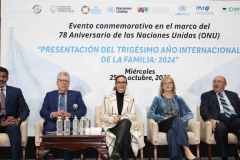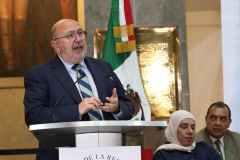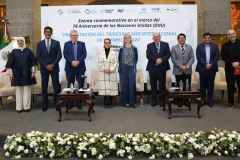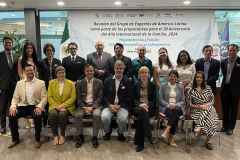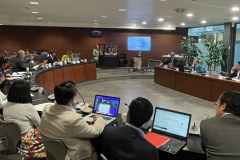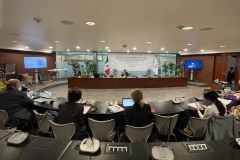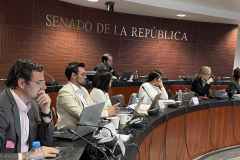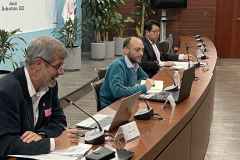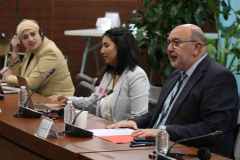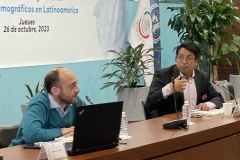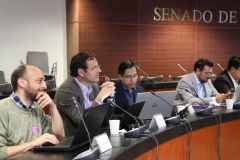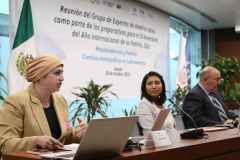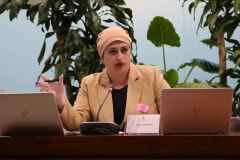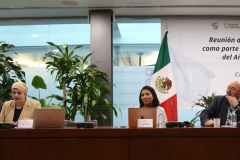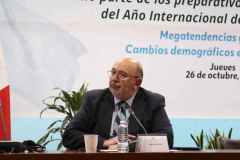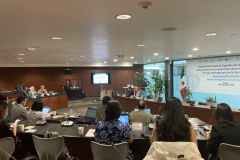

Latin American Expert Group Meeting
Megatrends & Families:
Focus on Demographic changes
in Preparation for the 30th Anniversary of the International Year of the Family
Senate of the Republic, México City, 26-27 October 2023
Focus on Demographic changes
The Instituto de Análisis de Política Familiar (IAPF), in partnership with the Focal Point on the Family, Division for Inclusive Social Development of the United Nations Department of Economic and Social Affairs (DESA), the International Federation for Family Development (IFFD) and Doha International Family Institute (DIFI) are organizing an Expert Group Meeting on “Megatrends and Families: Focus on Demographic changes in Latin America” to be held in México.
The meeting will build on the modalities for the preparations for the 30th anniversary of the International Year of the Family (IYF+30), which focus on several megatrends. The recommendations for the preparatory works have been reflected in the Reports of the United Nations Secretary General 2020 and 2021. In 2021, the General Assembly’s resolution on the preparations endorsed those recommendations and advised focusing on the trends of new technologies, migration, urbanization as well as demographic trends and climate change.
According to the previously mentioned resolution and relevant United Nations mandates, the Expert Group Meeting aims to address specifically on demographic changes in Latin America.
VIDEOS
Previous event on the Thirtieth Anniversary of the International Year of the Family (2024) at the old seat of the Mexican Senate (Casona de Xicoténcatl), October 25, 2023.
Opening Session of the Expert Group Meeting, with the participation of Senator Nancy de la Sierra and representatives of co-organizers of the event.
GALLERY
Purpose of the meeting
The primary objective of the Meeting is to bring together experts to discuss and explore the issues noted above. The conclusions and recommendations of this meeting will be included in the Report of the Secretary-General and will provide Member States and other stakeholders with expert analysis regarding several issues impacting recent family policy developments in the context of megatrends.
Megatrends and families
Demographic shifts wield profound implications for families, and it is within families themselves that many of these demographic changes originate. In essence, there exists a reciprocal relationship between family dynamics and demographic shifts.
This symbiotic relationship gives rise to various factors, including fertility and mortality (1), early childhood, parental education and positive parenting (2), changing roles of women and men (3), labor inequality and unpaid work (4), and migration (5).
1. Fertility, mortality and family dynamics
Assess support, caregiving, and safeguarding provisions for all family members, considering the implications of increased life expectancy and decreasing fertility rates within an expanding dual-worker household context. Address heightened rates of family disruptions and evolving familial configurations. Investigate strategies for enhancing healthcare, pension systems, and care-oriented policies.
Explore avenues for promoting robust and active aging, fostering intergenerational solidarity, and catering to the needs of elderly individuals facing vulnerabilities. Seek optimal approaches to establish high-quality and affordable community-based and institutional care services in instances where family-based support is insufficient. Raise awareness about the pivotal role of grandparents within families and underscore the broader societal significance of older individuals.
2. Early childhood, parenting education and positive parenting
Efforts aimed at advancing early childhood development, fostering positive parenting, and achieving a harmonious work-family balance through social (housing, social protection), economic (social security, labor flexibility), and educational (parental education) policies and programs yield enduring benefits for children’s long-term well-being.
Within the context of childhood development, it is imperative to examine the formulation, promotion, and implementation of policies and programs designed to eliminate child poverty by eradicating family poverty. This involves exploring social, economic, and educational strategies to break the intergenerational cycle of poverty; reinforcing employment stability; promoting comprehensive family services; and advocating for family-oriented fiscal policies and practices, including reduced taxes on early childhood products and services.
Simultaneously, it is of utmost importance to explore initiatives that acknowledge the significance of early childhood development. These initiatives should enable parents and primary caregivers to allocate more time for bonding and establishing secure attachments during a child’s formative years. Additionally, they should enhance access to health and child development services, affordable childcare, parental leave, and other effective approaches for nurturing children’s potential and enhancing their well-being.
Furthermore, these efforts should be complemented by an analysis of the development, investment, and implementation of programs aimed at strengthening families and providing parental education. This emphasis on positive parenting is crucial for preventing corporal punishment and domestic violence.
3. Recognition of unpaid work and shared responsibility at home
Account for the increasing prevalence of households with both partners engaged in employment; acknowledge the scarcity of time and cooperation in domestic roles and its effects on caregiving duties, child-rearing, the burden on women’s care responsibilities, and family fragmentation.
Examine the consequences of informal labor and the absence of conducive conditions for attaining decent employment on family dynamics, particularly the persistence of family poverty, impoverished single-parent households, and the perpetuation of the intergenerational cycle of poverty. Consider initiatives and exemplary practices aimed at enhancing the acknowledgment, safeguarding, and valuation of the socio-economic input stemming from unpaid care and domestic labor. This involves recognizing its financial, societal, and cultural dimensions, and ensuring the transfer of cultural and ethical values across generations.
Furthermore, it is pertinent to investigate measures taken to facilitate a work-life balance, thereby fostering a more substantial allocation of time for household responsibilities. This inquiry should also address cultural barriers that hinder greater collaboration between women and men in domestic roles.
4. Youth transitions and labor inclusion
Gaining a better understanding of policies implemented to address the social integration of young individuals during their transition into the labor market (encompassing social, economic, and educational policies) is of utmost importance. Additionally, it is crucial to examine economic and labor disparities, particularly concerning unpaid care and domestic work.
Further elaboration on policies designed to bolster the role of families during the process of socially including young people in their labor market transition is necessary. These policies aim to curtail the intergenerational cycle of poverty and encompass practical initiatives such as housing programs, professional exposure, foundational skills development, training, comprehensive social protection, access to financial resources, and ensuring adequate working conditions.
5. International Migration
International migration stands as a phenomenon with a significant impact on demographic dynamics within Latin America. Notably, there are pertinent migration pathways that stem from economic, political, and social circumstances.
This overarching trend, along with its implications for demographic shifts, has a bearing on family dynamics as well. Hence, proactive measures are imperative to acknowledge the advantages of the right to family reunification and to establish secure remittance mechanisms for migrants and their families. These measures should concurrently address the unique contextual needs and requisites of mothers, fathers, and caregivers.
Methodology
Experts are requested to submit a paper, deliver a concise presentation, engage in group discussions, and share their informed insights and policy suggestions regarding the advancement of development, monitoring and implementation in the areas mentioned above.
Furthermore, experts are anticipated to furnish concrete instances of successful practices pertinent to the subjects under consideration and offer detailed recommendations on the further development of policies, programmes and strategies supporting families in those goals.
Outcomes
- Background papers (5-7 pages, single-spaced) prepared by each expert on issues in this agenda and including policy recommendations.
- Report of the meeting containing the summary of discussion and policy recommendations prepared by DESA.
Papers by experts will cover issues identified in this agenda, explain their relevance, provide quantitative and qualitative evidence, analyze the roles of social institutions, give examples of good practices, offer conclusions and recommendations. The report and experts’ papers will be posted on the website of the DESA.
Organizational matters
- The meeting is held in person.
- A group of experts from the fields of family policy, demographic issues and related topics participate. The experts represent various regions of Central and South America and must provide a paper and a short presentation.
- Each session has 15 minutes introductory presentations by experts who introduce the topic and provide the context for the ensuing discussion.
- A moderator from each session leads the group discussion and is responsible for a brief summary and compilation of the recommendations from each session.
- Discussions and brainstorming are the preferred working method and no formal lecture-style presentations are anticipated.
- The working languages of the meeting are both Spanish and English simultaneously, with interpretation.
EXPERTS
Dana Al-Kahlout
She is Advocacy and Outreach Lead at the Doha International Family Institute. She has 13+ years of experience working in the field of family policy, specifically in relation to the promotion of evidence-based policy development and implementation on topics such as parenting, work-family balance, and marriage. Dana is currently undertaking her doctoral degree in Policy Research and Practice and holds an MA in Global Social Policy from the University of York.
Cimar Aparicio
Senior researcher at the Center for Population, Geographical and Demographic Studies of Universidade Federal do Espírito Santo at Vitória – UFES (Brazil). He is also a main researcher at the Seade Foundation and has also collaborated with the Núcleo de Estudos de População – NEPO at the Universidade Estadual de Campinas. He has collaborated with different public and private entities and has published studies on family demographic dynamics and migration patterns in Brazil.
Simone Cecchini
He is chief at CELADE – Population Division of the United Nations Economic Commission for Latin America and the Caribbean – ECLAC (Santiago de Chile). His work is focused on studying social protection policies and poverty reduction programs in the region, and he is an expert in the field of social indicators. He regularly contributes to research reports. Before joining ECLAC, he worked at the World Bank as a research analyst in the Poverty Reduction Department.
Pablo Gluzmann
He is a senior researcher at the Centro de Estudios Distributivos, Laborales y Sociales – CEDLAS, de la Universidad Nacional de La Plata – UNLP (Argentina), where he is an associate professor. He also works with the Consejo Nacional de Investigaciones Científicas y Técnicas (Conicet). His research focuses on topics related to inequality, poverty, labor markets, and macroeconomics and the results have been published in prestigious scientific journals.
Gabriela Márquez
She is the National Coordinator at the International Labour Organization – ILO office for Cuba & Mexico. She is a specialist in information analysis with a focus on public policies. Her career has been dedicated to devising strategies to enhance the management of government projects and programs. Currently, she monitors programs aimed at providing key stakeholders with statistical data to make evidence-based decisions.
Alejandra Mendoza
She leads the Department of Training and Corporate Responsibility at the Instituto de Análisis de Política Familiar (Mexico). She also works as a social responsibility consultant. Previously, she served as the Coordinator of Social Responsibility at the Escuela Bancaria y Comercial, and worked as the National Liaison Coordinator for Red Familia, providing services to 26 local coalitions and impacting over thirty thousand people nationwide through forums, conferences, and congresses.
Enrique Peláez
He is a main researcher at the Centro de Investigaciones y Estudios sobre Cultura y Sociedad – CIECS, and Associate Professor at the Universidad Nacional de Córdoba (Argentina). He is a consultant for the United Nations Population Fund – UNFPA, and has served as president of Asociación Latinoamericana de Población – ALAP. His areas of work and research include Population Aging, Mortality, demographic projections, and studies on vulnerability and urban residential segregation.
Fernando Pliego
Since 1993, he has been a full-time researcher at the Institute of Social Research of the Universidad Nacional Autónoma de México, where he coordinates the projects: ‘The Gender and Family Perspective and the Future of Democratic Societies’ and the ‘International Observatory of Families and Family Policy.’ He is a professor in the Graduate Program in Political and Social Sciences at UNAM. He is the author of various publications, among which several books on family topics.
Francisco Javier Solís
He has engaged in various activities at the Instituto de Análisis de Política Familiar (Mexico), including serving as a legal advisor, public policy coordinator and advisor, and director of public policy. He has researched on family policy and has also worked as a legislative advisor to the presidency of the Justice Commission and technical secretary of the pre-examination Subcommittee, drafting reports on various bills and legislative proposals, primarily focusing on jurisdictional matters.
Elizabeth Thomas-Hope
She is a full professor at the Department of Geography and Geology of the University of the West Indies at Mona (Jamaica). His research focuses on population issues in the Caribbean; environmental issues; rural and urban development in the Caribbean; and health and social issues. Her work considers migration behavior as a response to Caribbean circumstances and an intrinsic part of the formation of the image of self and life chances of the individual.



